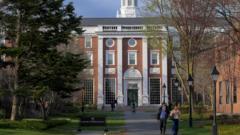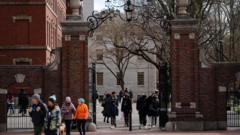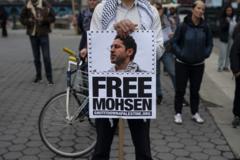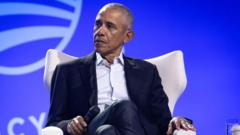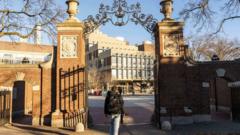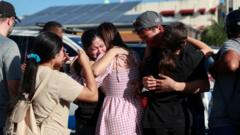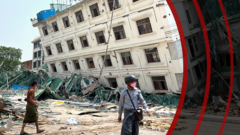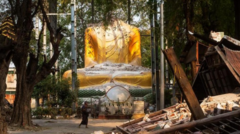Survivors of Auschwitz gathered to commemorate the 80th anniversary of the camp's liberation, delivering powerful messages about the dangers of intolerance and the necessity of remembering history as their numbers dwindle.
Survivors of Auschwitz Reflect on History and the Urgent Need for Remembrance
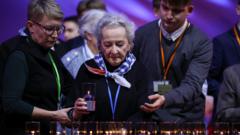
Survivors of Auschwitz Reflect on History and the Urgent Need for Remembrance
As Auschwitz marks 80 years since its liberation, survivors deliver poignant messages on the importance of tolerance.
In a solemn ceremony held at Auschwitz, 56 survivors of the notorious extermination camp shared their harrowing memories and offered urgent warnings about the consequences of intolerance and hatred. The event marked 80 years since the Red Army liberated the camp, with dignitaries including Polish President Andrzej Duda and King Charles III paying their respects.
Leon Weintraub, the oldest survivor present at 99 years old, spoke movingly of the loss of humanity experienced during the Holocaust, emphasizing the need for younger generations to remain vigilant against signs of intolerance. "We were stripped of all humanity," he declared, urging attendees to be sensitive to expressions of resentment towards differences in culture and identity.
Tova Friedman, who experienced the horrors of Nazism as a young child, revealed the anguish she felt watching her peers being taken to their deaths. Other survivors, like 94-year-old Janina Iwanska, recounted sharing their stories of survival under the shadow of the infamous figure, Josef Mengele. Survivor Marian Turski lamented the dwindling number of survivors and reflected on the millions who could no longer share their personal narratives of suffering and inhumanity.
With various global leaders present, including Ukrainian President Volodymyr Zelensky, the ceremony emphasized the critical importance of historical memory. King Charles III made history as the first British monarch to visit Auschwitz, expressing the vital task of remembering "the evils of the past." He stated that teaching younger generations about past atrocities is everyone's responsibility, as survivors like Mala Tribich echoed the need to safeguard against hatred incited by oppressive regimes.
Piotr Cywinski, director of the Auschwitz museum, drove home the need to preserve the painful history encapsulated within the camp. As the likelihood of hearing firsthand accounts from survivors diminishes, he stated, "Memory hurts, memory helps, memory guides… without memory you have no history."
The event became a remembrance not just of the past but also a call to combat the growing threat of Holocaust denial and historical distortion. Reports indicate a troubling belief in the potential for similar atrocities in the present day, highlighting the need for continued education and awareness.
Amidst the poignant recollections, many agreed that safeguarding the memories of the Holocaust is essential for preventing its recurrence, nurturing a kinder and more compassionate future for all.


